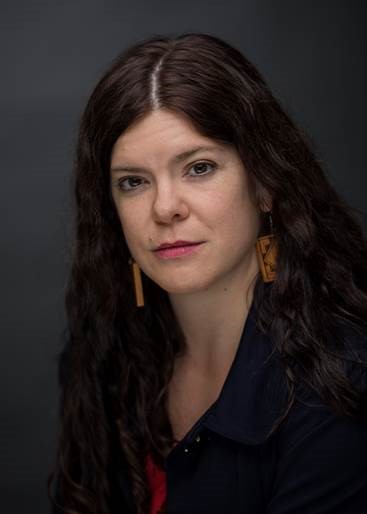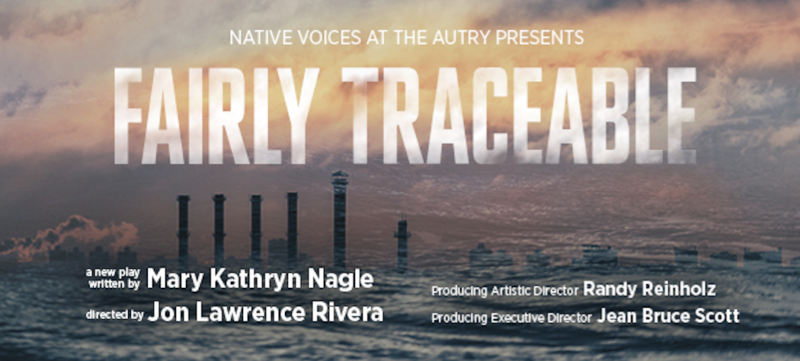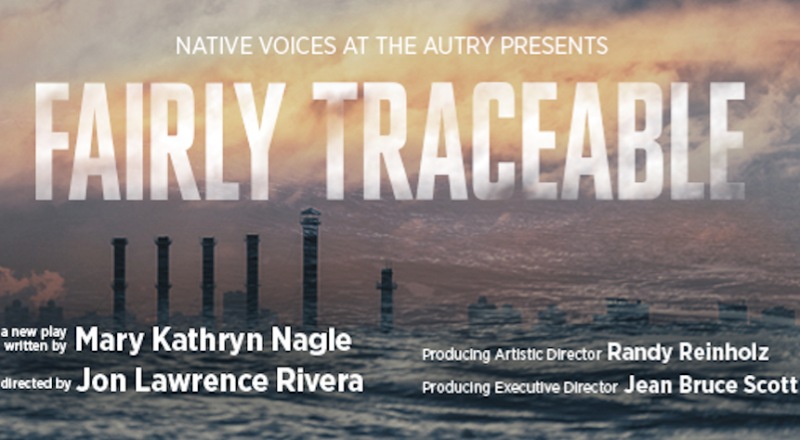INTERVIEW: Personal change, climate change subject of Native Voices premiere

Playwright Mary Kathryn Nagle’s new play will soon premiere at Native Voices at the Autry Museum of the American West in Los Angeles. Fairly Traceable explores the personal and legal implications of climate change and environmental destruction, themes that have taken on a new light in the first 100 days of the current president’s administration.
Performances for the world premiere begin March 8 and run through March 26. Nagle will take part in post-show discussions after the 2 p.m. matinees March 11 and 12.
“I first started writing it when I had a one-year stint with the Civilians in New York,” Nagle said recently in a phone interview. “They have a thing called R&D group, research and development, and they bring writers and sometimes musicians or choreographers, if the piece is a musical, together for a year to meet once every two weeks to share pages and to share work. You just have to write something that’s based on a true story or a question. They like to say they don’t do documentary theater; they do investigative theater. So you have to be investigating the question, and that usually involves interviewing someone or reading documents.”
While a part of the R&D group a few years ago, Nagle wrote the first draft of Fairly Traceable. The Civilians hosted a staged reading, but Native Voices will host the first fully staged production.
The playwright went through the submission process at Native Voices, a competitive program that sees Native American playwrights from around the country vying for a spot on the Autry’s theatrical calendar. After the program’s directors expressed interest in Fairly Traceable, Nagle had to go through a more in-depth process of editing the play and crafting a statement about what she hoped to accomplish with the production.
“It’s all about a legal doctrine,” she said of the play’s subject matter. “One of my law professors from law school is a character in the play. My experience actually in law school was very informative, very impactful, and therefore I wrote about it. … I would think that most people would agree that it’s a play that only a lawyer would write.”
TWO CHARACTERS TELLING AN EPIC STORY
Nagle, who is a citizen of the Cherokee Nation, developed two main characters in the piece: a young Ponca man and a Chitimacha woman who is a law student at Tulane University. These characters live in a post-Katrina Louisiana and struggle with both their personal ambitions and the legal drama surrounding corporate polluters and the impact of climate change.
“I’ve done a lot of work with the Ponca, and I’ve written other plays with them,” said Nagle, a partner at Pipestem Law and expert in federal Indian law. “So I’m more familiar with many of their stories than some other tribes, and I knew that on their Trail of Tears, they survived a tornado. And that story always stuck with me.”
The playwright wanted to explore what it means to be in one’s darkest moment, when a powerful nation is trying to eliminate a people “from the face of the earth, and in that moment of despair, just trying to survive genocide, out of the sky drops a tornado. And so now the land is seemingly attacking you. What does that mean? I wanted to think about that.”
In Nagle’s play, this Ponca man is a descendant of Chief Standing Bear, who in 1879 won a court case in Omaha, Nebraska, in which the federal judge decided Native Americans to be persons under the law. More information on Standing Bear v. Crook can be found here.
“So what does it mean if that’s your identity, if that’s who you are, if that’s where you come from,” she said. “I thought that would be a very powerful journey for him.”
The other character went through many different edits in the writing process. The original inspiration for the Chitimacha woman came from real-life case studies of Native American communities facing a vanishing community in light of climate change. In particular, she was influenced by the legal saga of the village of Kivalina, Alaska.
The villagers sued the world’s largest fossil fuel companies because their homes are threatened by the rising seas around their tiny outpost in Alaska, according to PRI.
“The federal courts kicked it out because of the fairly traceable doctrine,” Nagle said of the doctrine that gave her play its title. “Also they used the political question doctrine, which the play doesn’t really go into just because I think it’s best to tackle one legal doctrine in a play not 20.”
According to an Autry press release: “The title of the production refers to Justice Antonin Scalia’s written opinion for the majority in the Supreme Court case Lujan v. Defenders of Wildlife (1992).”
In the same release, Nagle stated, “Scalia’s ‘fairly traceable’ doctrine has been used repeatedly by federal courts to prevent climate change victims from holding those who profit from environmental destruction accountable. … We, as Americans, must recognize that preserving our land, water, and air for future generations is critical to the preservation of human civilization. We must also consider the Supreme Court’s decision to ask whether it truly represents the values enshrined in our Constitution.”
Nagle’s first draft included the Chitimacha woman, a law student in the play, going up to Alaska and helping the villagers with their lawsuit. “And it just got way too epic,” she said. “Here we’ve got Katrina and then the Joplin tornado and then Alaska. I mean the play is still very epic, but it was like, OK, how do I compact this a little bit. And then I was like, wait a second. I went to law school at Tulane [University]. I know that there are tribes in Louisiana that are about to lose their homeland. Why am I trying to tell the story of Alaska when these are students at Tulane? They should be dealing with the reality there.”
Nagle is good friends with Professor Patty Ferguson-Bohnee of Arizona State University; the academic is a member of the Pointe-au-Chien Indian tribe in South Louisiana.
Nagle said: “I just started talking to her and I said, ‘Look, I really want to tell this story in this play, and I really think the story of how Pointe-au-Chien is about to go underwater is really important. Could I come talk to you about that?’ And she invited me last Memorial Day weekend to come visit her family and to visit their home where they’ve always lived, and her uncle took me out on the bayou and showed me where the cemetery is underwater now because the sea levels are rising where her great-great grandparents are buried. It’s just really sad to see them. They’re on the brink of losing their homes completely, especially if climate change isn’t reversed.”

The events of Fairly Traceable are quite topical. The administration of President Donald Trump could have a great impact on relationships with Native American tribes, especially with the continued protests of the Dakota Access Pipeline in Standing Rock, North Dakota. Nagle said she’s unsure what the president will do in terms of tribal sovereignty.
“Certainly the trend over the last several decades has been American presidents respecting tribal sovereignty out of recognition for the sovereign-to-sovereign government relationship between tribes in the United States,” she said. “It’s a very significant relationship that began right after the United States was born. Before that, tribes were signing treaties with France and Great Britain and many other countries. … We don’t yet know what exactly Trump will do as president, but I think that any conversation right now about sovereignty and the right to self-govern of tribal nations is very critical because I think there’s so much that’s unknown, and there’s so much that most Americans don’t know in general about tribal nations.”
THE VALUE OF NATIVE VOICES
Understanding these issues of tribal sovereignty, corporatism, climate change and identity are also the reason why Native Voices at the Autry exists in the first place. Nagle said that she cannot emphasize enough how important it is for Native American playwrights to have an outlet to explore these crucial, critical topics. The initiative is headed by Randy Reinholz, producing artistic director, and Jean Bruce Scott, producing executive director. Jon Lawrence Rivera directs the new play.
“As of right now, this will be my second production only,” she said. “I look at my career, and anything that happens from here on out, I know I will owe a huge debt of gratitude to Amerinda [in New York City] and to Native Voices at the Autry because my first two professional productions came from them. And you learn so much as a new playwright when you actually get to see your play produced. There’s such a huge learning curve.”
She added: “You’ve already got a United States where even though native people were the first ones to live here — our history is written all over the lands; you can’t escape it — it’s not taught in our schools, so you have an audience who is ignorant, completely ignorant of a story and of a people. And then the only thing they usually see is a misrepresentation, and then all of a sudden, theaters are confronted with an accurate representation, an authentic representation. But they’re not familiar with it. It’s not a familiar story. … No one is giving us a chance to hone our craft, to practice it, to develop it, and so I can’t say enough. For me, personally, I would have nothing if it wasn’t for the two native theater companies that to date are the only professional theater companies that have produced my work professionally. It’s a huge gift that they’ve given me.”
By John Soltes / Publisher / John@HollywoodSoapbox.com
Fairly Traceable by Mary Kathryn Nagle will play Native Voices at the Autry Museum of the American West in Los Angeles, March 8-26. Click here for more information and tickets.

